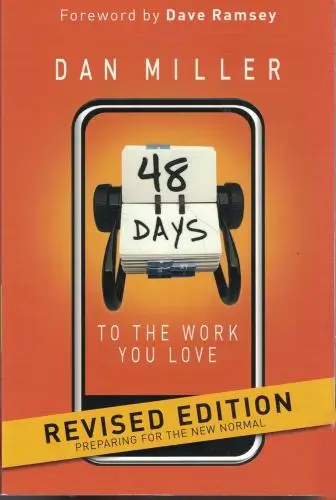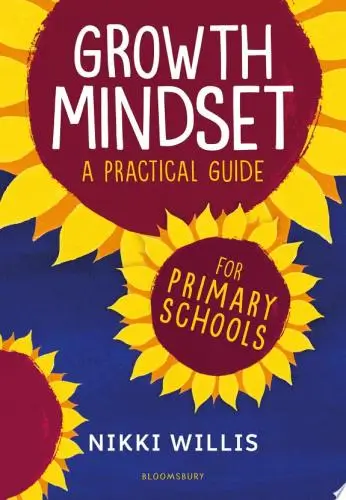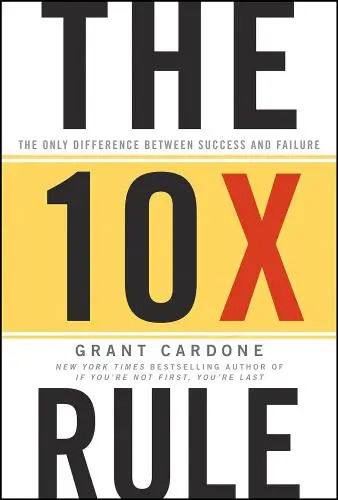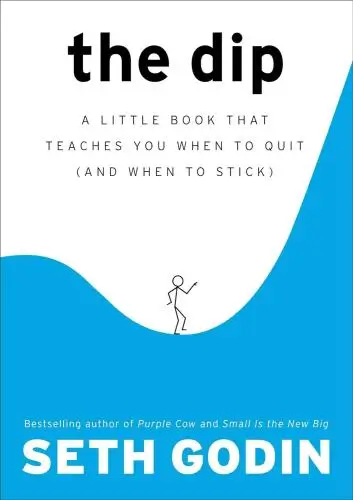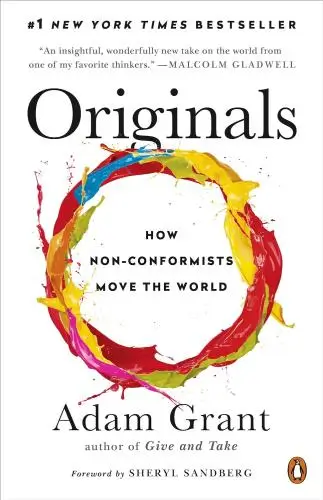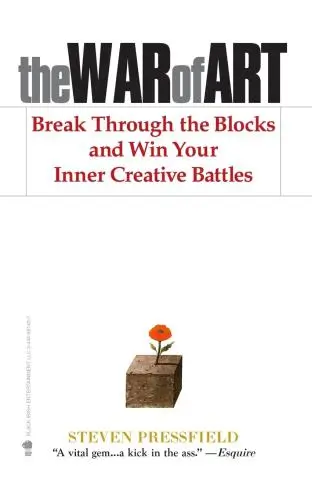48 Days to the Work You Love
Preparing for the New Normal
What's it about?
48 Days to the Work You Love provides a step-by-step guide to help you discover your passion, set goals, and find a fulfilling career. Dan Miller emphasizes the importance of aligning your work with your values and interests, offering practical advice and exercises to help you navigate the job market with confidence. With a focus on personal development and mindset shifts, this book is a valuable resource for anyone looking to find meaningful work that brings joy and fulfillment.
About the Author
Dan Miller is a prolific author known for his motivational books such as "48 Days to the Work You Love" and "No More Dreaded Mondays." His writing style is practical and insightful, offering actionable advice for finding passion and purpose in work. Miller's unique perspective emphasizes the importance of aligning personal values with career choices, making his work a valuable resource for those seeking fulfillment in their professional lives.
10 Key Ideas of 48 Days to the Work You Love
Understanding the True Meaning of Work and Aligning It with Your Life's Purpose
Work should not just be viewed as a means to make money, but as a way to make meaning.
By aligning your career with your life’s purpose, you can achieve greater satisfaction and effectiveness.
This involves introspection to understand your skills, passions, and values, and seeking or creating work opportunities that resonate with these elements.
When your work is in harmony with your personal vision, it not only feels more fulfilling but also enhances your productivity and creativity.
Learn DeeperReflect on Your Passions and Skills: Set aside time each week to reflect on what you truly love doing and what you're good at. Consider past experiences, hobbies, and feedback from others to identify your strengths and interests.
Define Your Life's Purpose: Write a personal mission statement that outlines your core values and what you want to achieve in life. This will serve as a guide to align your career choices with your life's purpose.
Research and Network: Look for industries or roles that align with your passions and skills. Use platforms like LinkedIn to connect with professionals in those areas. Ask them about their work and how they find meaning in it.
Seek or Create Opportunities: Don't wait for the perfect job to come to you. Seek out opportunities that align with your mission statement, or consider creating your own path through entrepreneurship or freelance work.
Continuously Evaluate and Adjust: Regularly assess whether your work is still aligned with your life's purpose. Be open to making changes, whether it means seeking new opportunities, acquiring new skills, or even changing careers.
- Example
A graphic designer realizes her passion lies in environmental activism. She starts to seek out projects and clients in the green sector, aligning her work with her values and making her daily tasks more meaningful.
- Example
An accountant, passionate about education, volunteers his skills to a local non-profit focused on literacy. He finds this volunteer work deeply fulfilling and eventually transitions to a full-time role in the non-profit sector, aligning his career with his purpose.
Setting Clear Goals by Defining What Success Looks Like to You
Success is a personal definition that varies from one individual to another.
It is crucial to define what success means to you personally rather than adopting societal standards.
This could involve financial stability, personal growth, contribution to society, or work-life balance.
Setting clear, achievable goals based on this personalized definition helps direct your efforts and resources efficiently, keeping you motivated and focused on what truly matters to you.
Learn DeeperReflect on Your Values and Passions: Spend some time alone, away from distractions, to think deeply about what truly matters to you. What activities make you lose track of time? What achievements would make you proud?
Set SMART Goals: Make your goals Specific, Measurable, Achievable, Relevant, and Time-bound. For example, instead of saying 'I want to be happy in my job,' specify 'I want to find a job role that involves creative writing and allows for flexible working hours within the next six months.'
Create a Vision Board: Visualize your success by creating a board with images and words that represent your goals. This can serve as a daily reminder and motivation.
Break Down Your Goals: Divide your main goals into smaller, manageable tasks. If your goal is to change careers, start with updating your resume, then move on to networking, and so on.
Review and Adjust Regularly: Set a regular schedule to review your goals and progress. Be prepared to adjust your goals as needed. Life changes, and so might your definition of success.
- Example
If personal growth is part of your definition of success, a practical goal could be to read one self-improvement book per month and apply at least one thing you learned from each book.
- Example
For someone who defines success as contributing to society, a goal might be to volunteer a specific number of hours each week with a local charity or organization that aligns with their values.
The Importance of a Positive Attitude in Overcoming Career Obstacles
A positive attitude is essential when facing the inevitable challenges and setbacks in your career path.
It helps in maintaining resilience and perseverance, which are critical for long-term success.
Positivity also influences how others perceive and respond to you, potentially opening up more opportunities.
Moreover, a constructive outlook enables creative problem-solving and keeps you engaged and less prone to burnout.
Learn DeeperStart Your Day with Positivity: Begin each morning by reading or listening to something motivational. This could be a podcast, a chapter from an inspiring book, or even a positive affirmation. Setting a positive tone for the day can influence your mindset and interactions throughout.
Practice Gratitude: Keep a gratitude journal where you jot down things you're thankful for each day. This practice helps shift focus from challenges to blessings, fostering a more positive outlook that can enhance resilience in your career.
Surround Yourself with Positive Influences: Be mindful of the company you keep. Surround yourself with people who uplift you and have a positive outlook on life. Their energy can be contagious and help you maintain a constructive perspective.
Reframe Challenges as Opportunities: When faced with obstacles, try to view them as opportunities for growth rather than insurmountable problems. Ask yourself what you can learn from the situation and how it can make you stronger or more skilled.
- Example
If you receive a project at work that seems overwhelming, instead of thinking, 'I can't do this,' reframe it as, 'This is a chance to push my boundaries and grow.' Break the project down into manageable tasks and celebrate small victories along the way.
- Example
When receiving constructive criticism, instead of taking it personally or feeling defeated, see it as valuable feedback to improve your skills. Thank the person for their input and create a plan on how to implement their suggestions.
Embracing Lifelong Learning to Stay Relevant in Your Field
In an ever-evolving job market, continuous learning is key to maintaining and enhancing your employability.
This includes formal education, self-study, professional development courses, and practical experiences.
Staying updated with industry trends, technologies, and skills prevents obsolescence and positions you as a valuable asset in your field, thereby increasing your career stability and advancement opportunities.
Learn DeeperSet aside dedicated time each week for learning: Whether it's an hour a day or a few hours over the weekend, make continuous learning a non-negotiable part of your schedule. This could involve reading industry-related books, taking online courses, or even listening to podcasts relevant to your field.
Join professional groups or online communities: Engaging with peers in your industry can provide insights into emerging trends and technologies. Participate in discussions, attend webinars, and take advantage of networking opportunities to learn from the experiences of others.
Implement what you learn in real-life projects: Applying new knowledge to your current job or personal projects not only reinforces what you've learned but also demonstrates your initiative and updated skill set to employers. It can be as simple as using a new software tool in your work or starting a side project to experiment with new concepts.
Seek feedback and mentorship: Regularly ask for feedback on your work from colleagues, supervisors, or mentors. This can highlight areas for improvement or new skills to learn. Additionally, a mentor can guide you through your learning journey, offering advice and resources based on their own experiences.
- Example
If you're in digital marketing, you might dedicate an hour each Thursday to learn about the latest SEO strategies through online courses or webinars. Then, apply these strategies to your current projects and track the results for discussion in your next team meeting.
- Example
As a software developer, joining a coding community online can keep you abreast of new programming languages and frameworks. Participate in hackathons or coding challenges offered by the community to practice these new skills in a practical, project-based environment.
Networking: Building Relationships That Fuel Professional Growth
Networking is not merely about exchanging business cards; it's about building meaningful relationships that can provide support, advice, and opportunities.
Active networking involves engaging with peers, mentors, and industry leaders, which can lead to new job opportunities, partnerships, or insights that enhance your career.
Effective networking requires genuine interaction and offering value to others, establishing a give-and-take relationship that fosters mutual growth.
Learn DeeperInitiate Conversations at Industry Events: Don't wait for others to approach you. Be proactive in starting conversations at conferences, workshops, and seminars. Ask open-ended questions to learn more about the people you meet and their work.
Offer Your Help Without Expecting Immediate Returns: Think about how you can assist the people you connect with. Can you introduce them to someone, share a resource, or offer your expertise on a subject? Doing so builds goodwill and establishes you as a valuable member of your network.
Follow Up and Keep in Touch: After meeting new contacts, send them a brief message mentioning something specific from your conversation. Then, periodically check in with updates or articles they might find interesting. This keeps the relationship alive and shows you value the connection.
Engage on Professional Social Media Platforms: Regularly post, comment, and share relevant content on platforms like LinkedIn. This not only showcases your expertise but also keeps you visible to your network and potential new connections.
- Example
At a local business networking event, Alex meets Maria, a marketing professional. Alex initiates a conversation by asking about the biggest challenges in marketing today. They exchange ideas, and Alex offers to share a recent article he found on digital marketing trends. A week later, Alex sends Maria the article along with a note to keep in touch, laying the groundwork for a supportive professional relationship.
- Example
Jordan attends a webinar on project management and connects with the speaker on LinkedIn with a message expressing appreciation for the insights shared. Jordan mentions a specific takeaway and how it will be applied in their work. Over time, Jordan shares relevant articles and resources with the speaker, fostering a mutually beneficial connection.
Deeper knowledge. Personal growth. Unlocked.
Unlock this book's key ideas and 15M+ more. Learn with quick, impactful summaries.
Read Full SummarySign up and read for free!
48 Days to the Work You Love Summary: Common Questions
Experience Personalized Book Summaries, Today!
Discover a new way to gain knowledge, and save time.
Sign up for our 7-day trial now.
No Credit Card Needed

Similar Books
Trending Summaries

Peak
Anders Ericsson
Never Split the Difference
Chris Voss
Smart Brevity
Jim VandeHei
The Psychology of Money
Morgan Housel
The First 90 Days
Michael D. Watkins
Atomic Habits
James Clear
Thinking, Fast and Slow
Daniel Kahneman
The Body Keeps the Score
Bessel van der Kolk M.D.
The Power of Regret
Daniel H. Pink
The Compound Effect
Darren HardyNew Books

Comprehensive Casebook of Cognitive Therapy
Frank M. Dattilio
The White Night of St. Petersburg
Michel (Prince of Greece)
Demystifying Climate Models
Andrew Gettelman
The Hobbit
J.R.R. Tolkien
The Decision Book
Mikael Krogerus
The Decision Book: 50 Models for Strategic Thinking
Mikael Krogerus
Fichte
Johann Gottlieb Fichte
Do No Harm
Henry Marsh
This is Going to Hurt
Adam Kay
